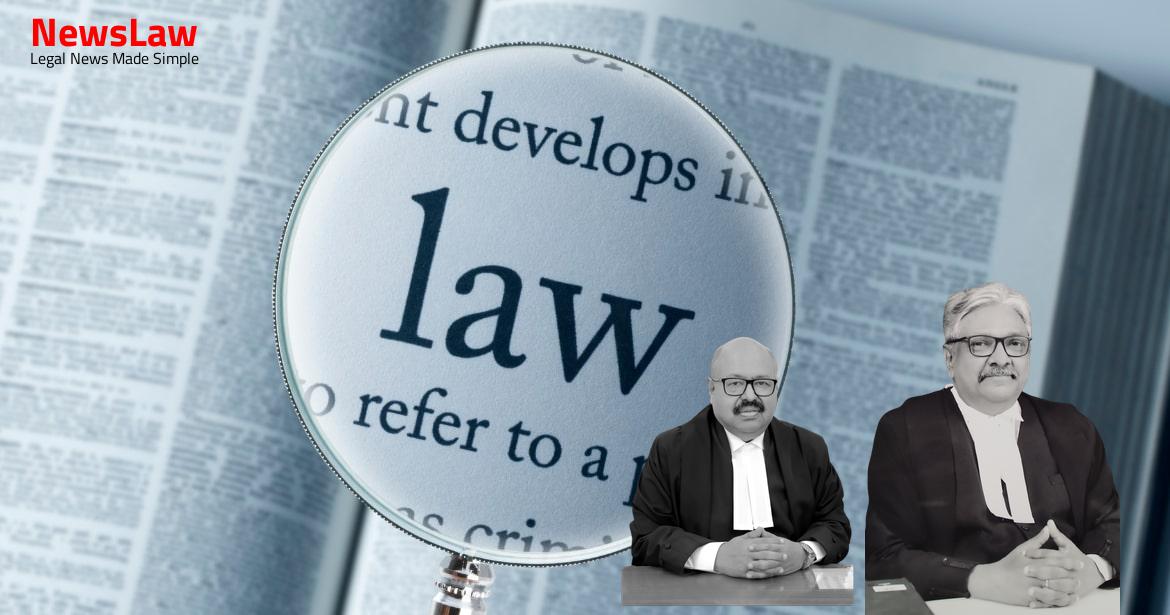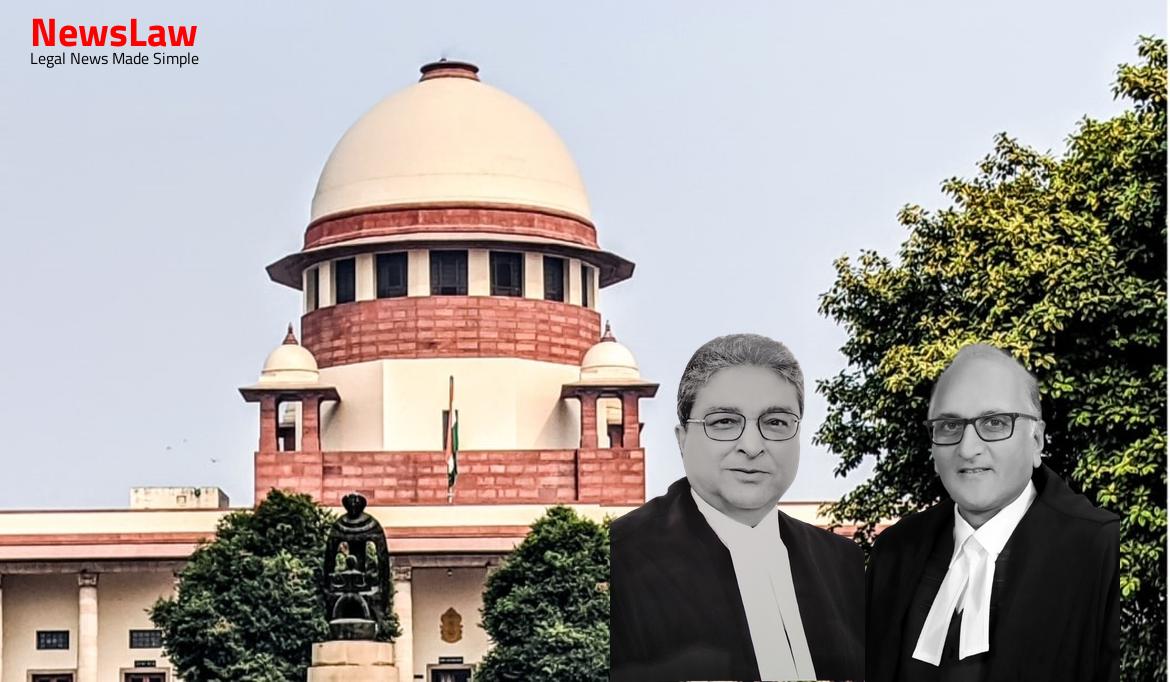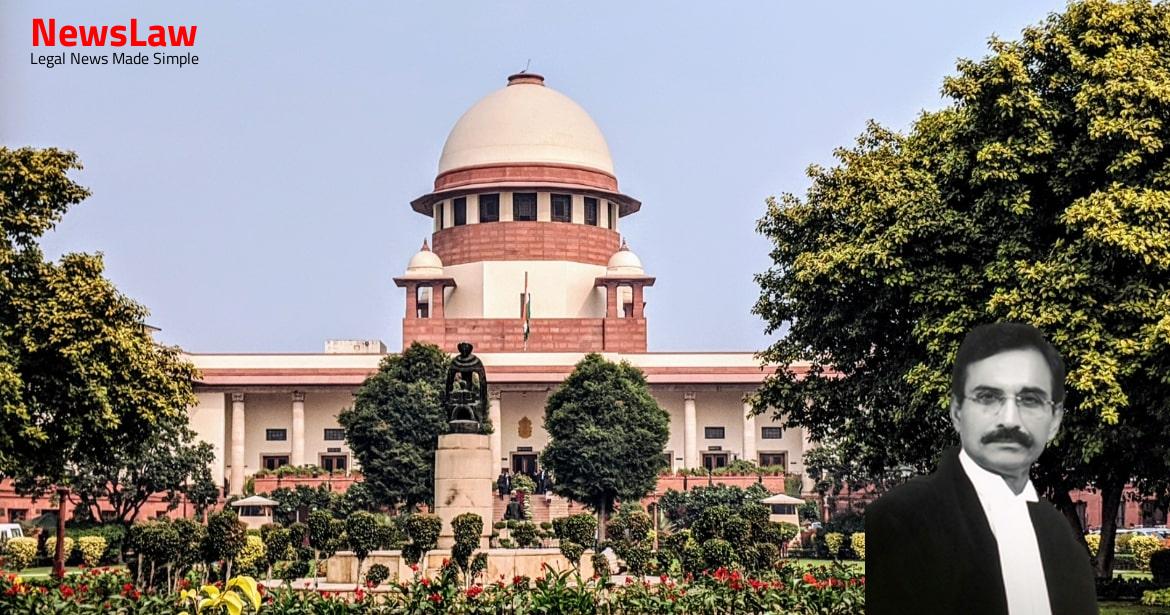Explore the legal intricacies surrounding employee transfers and absorptions in Development Authorities as per recent judicial analysis. The court’s thorough examination of the case sheds light on the complexities of employment law within administrative bodies. Stay tuned for a comprehensive overview of the legal aspects involved in such transfers and absorptions.
Facts
- The Writ Petition filed by the first respondent was disposed of.
- No such instruction was issued to SADA Malajkhand.
- Initially, the Rules of 1976 were applicable.
- Shri G.N. Singh another petitioner, was shown at serial No 58.
- The State Government, by Order dated 20.12.1988
- Subsequently, Respondent No.1 was absorbed in the service of the Gwalior Development Authority.
- After a period of eighteen years, it could not be held that Respondent No.1 was not an employee of GDA.
- Till such time when Shri S.K.Saxena does not give option for going back to the Local Self Government Department, no question arises of sending him back from this department, because of the fact that when notification of abolition of Special Development Authority was issued on 22.06.1995 at that time Shri Saxena was posted in ·Gwalior Development Authority.
- GDA was constituted under Section 38.
- The contention that the promotion of the first respondent as Assistant Engineer was a case of deputation was rejected.
- According to the rules, to be promoted as Assistant Engineer, a person must have worked for 12 years.
- The impugned Order dated 30.07.2003 was quashed, and the first respondent was directed to be treated as Assistant Engineer in GDA from 09.1987.
- The learned Single Judge found a failure to comply with the principles of natural justice.
- The first respondent was promoted in 1987 with less than five years of service.
- The Division Bench decision in S.C. Hiranandani & Ors. v. State of M.P. & Ors. was relied upon by the Single Judge.
- The 1976 Rules were considered a complete code, not to be superseded by PWD Recruitment Rules.
- The transfer by the State Government was considered a mode of recruitment.
- Vacancies existing prior to 31.03.1988 were required to be filled in accordance with the 1976 Rules.
- The initial judgment was recalled due to the first respondent concealing the fact about a pending earlier Writ Petition.
- No documents were produced to show the retention of the first respondent’s lien in the earlier SADA.
- The transfer of the first respondent was found to be prior to the 1991 Amendment Act.
Also Read: Legal Analysis of Assignment and Ratification in Property Law
Arguments
- The constitution, functions, budget, and officers of the first respondent are separate and distinct.
- The first respondent claimed to be absorbed into the GDA by a State Government order dated 09.11.1995.
- The State’s argument is that the first respondent was transferred by the State Government under Section 72 of the Act, different from the power under Section 73.
- Section 72 of the Act empowers the State Government to exercise superintendence and control over the acts of officers appointed under Section 3 and Authorities under the Act.
- Section 73 of the Act deals with the power of the State Government to give directions to all Authorities in matters of policy.
- This contention was taken before the learned Single Judge and was noted.
Also Read: Analysis of Rule 54 in Disciplinary Proceedings
Analysis
- The State Government filed a Special Leave Petition challenging the Judgment in Writ Appeal No 48 of 2014.
- The Gwalior Development Authority (GDA) challenged the Judgment in Writ Appeal No 481 of 2013.
- The State and GDA did not challenge the Judgment in Writ Appeal No 327 of 2013, which became final for the GDA.
- The State’s reliance on Section 72 of the Act regarding supervision and control over officers appointed under Section 3 was not accepted by the court.
- The Appeal filed by the State was dismissed, and the court found no grounds to disturb the impugned judgment based on previous litigation history.
- The petitioner in the case was an employee of the Development Authority and was later transferred to a Town Improvement Trust.
- Subsequently, his service was terminated, and this termination was approved by the Chairman.
- The Division Bench of the High Court was dealing with this case.
- Seniority should be governed with reference to the requirement of 12 years
- Declining to interfere in this case
- Bearing in mind Article 136
Also Read: Interpretation of Custody in Contempt of Court Case
Decision
- The appeals are dismissed
- The Constitution of India facilitated these appeals
Case Title: GWALIOR DEVELOPMENT AUTHORITY GWALIOR Vs. SUBHASH SAXENA (2022 INSC 302)
Case Number: C.A. No.-001977-001977 / 2022



